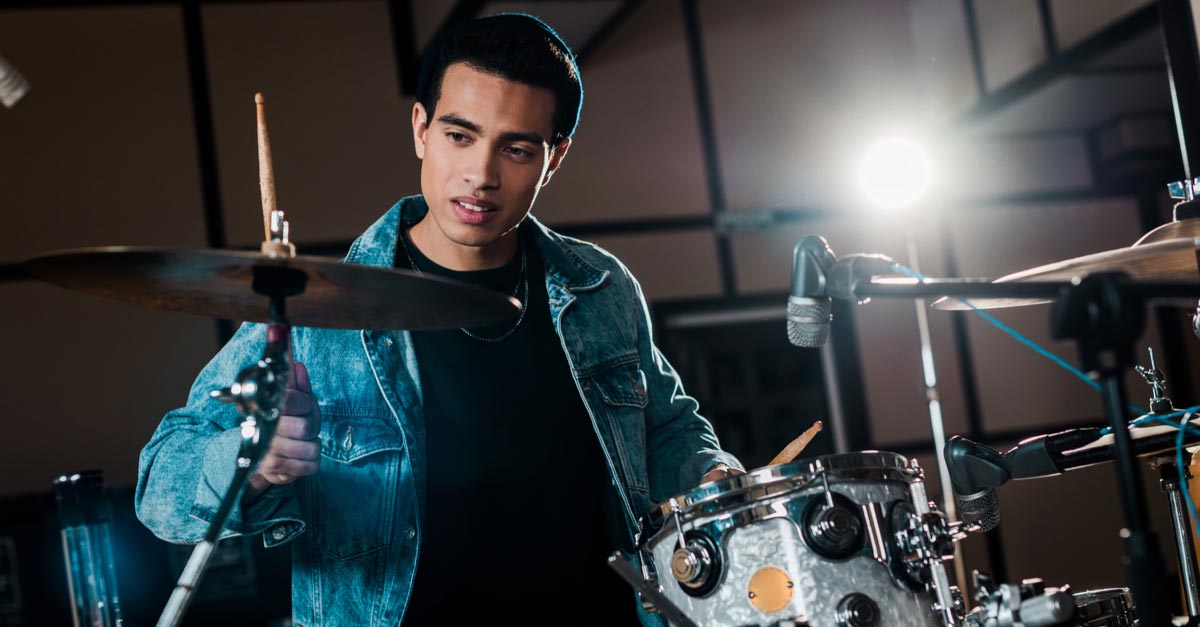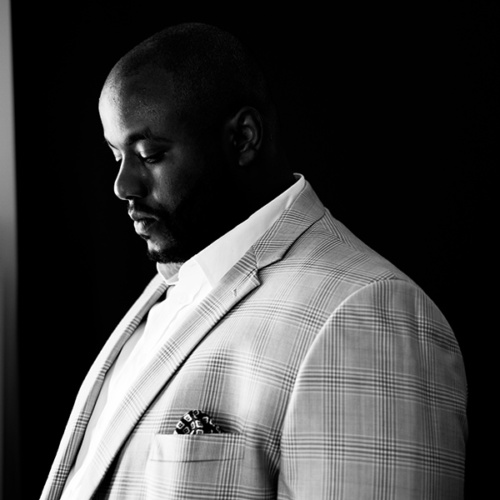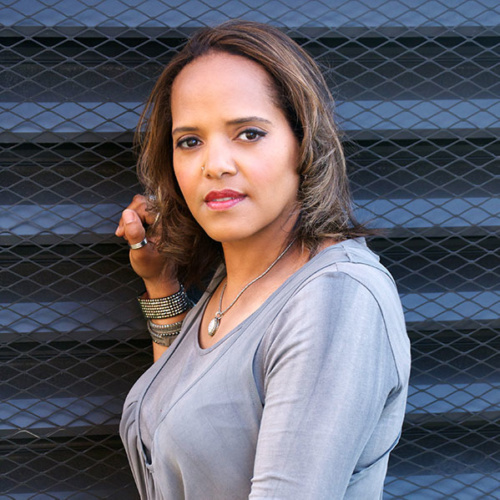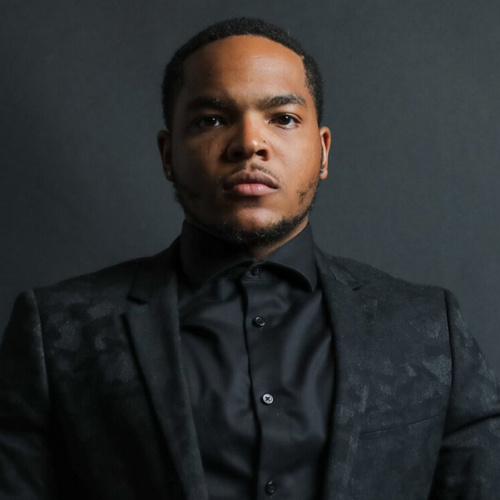Music Career Finder
Survey Start
Drummer
Career Overview
A Drummer is a musician who provides rhythmic accompaniment in an ensemble or band using percussion instruments like drums, cymbals, and drumsticks.
Alternate Titles
Percussionist
Salary Range
$0 to $100,000+

How To Become a Drummer
- A drummer plays the drums, usually as part of a band or orchestra
- Drummers can make a living touring, recording drums, teaching drums, or a combination of many paths
- Expert drummers highly recommend taking private drumming lessons
- You don’t have to earn a degree in music, but it can be helpful
- The average income for drummers is $12,500 a year (but this varies widely)
- Career Description
- Salary
- Career Outlook
- Career Path
- Experience & Skills
- Education & Training
- Sources
- References
Career Description
A drummer is a musician who plays a drum set, keeping the rhythm for the other musicians involved.
What Does a Drummer Do?
Here are the main responsibilities of a drummer:
- Keep the time
- Provide the rhythmic underpinning of the music (i.e. the groove)
- Guide the dynamics of a song
- Play supplemental percussive instruments, like a tambourine, cowbell, shakers, wood blocks, etc.
- Lock in rhythmically with the rest of the rhythm section, like the bass guitar and additional percussionist
At the same time, drummers need to know what’s going on musically in the song, like song structure, chords, and lyrics. They need to adjust the dynamics based on the different parts of a song.
A Day In the Life of a Drummer
There are two main types of career drummer you can be: a touring drummer and a studio drummer. You can do one or the other, or a combination of both.
If you’re a touring drummer, you’ll spend most of your days on the road, sleeping in a bus, RV, or cheap hotel. Then you’ll be loading in and setting up your drum set 4-5 nights a week, tear it down after each show, and load it back into the van or truck.
If you’re a studio drummer, you’ll spend your days in a professional recording studio playing drums for others’ songs. Or you could work remotely, which requires you have a home recording studio and know how to record a full drum set.
Salary
According to ZipRecruiter, the average salary for a drummer is $12,500 a year1.
But it can vary widely depending on what type of drummer you are and whether you’re a touring drummer, a session drummer, or a mixture of both.
Drummer Ray “Quasi” Nelson (Kehlani, The Legendary Count Basie Orchestra, Sabrina Claudio) said you could make $800-1,000 a week as a touring drummer on the low end. But that would only be when you’re on tour.
Drummer Terri Lyne Carrington (Terri Lyne Carrington and Social Science, Herbie Hancock, Esperanza Spalding) said some drummers make $100-200 per gig while other, more experienced drummers can make $1,000-2,000 per gig.
How Do Drummers Make Money?
Here’s how a touring/performing drummer can make money:
- A per-gig flat-rate fee
- A percentage of what the venue pays the performers
- A percentage of merch profits (if they’re in a band)
- Performance royalties (if they’re playing songs they’ve written)
Here’s how a session drummer can make money:
- A per-session flat-rate fee
- Hourly rate
- Publishing royalties (if they had a hand in writing the song)
- Master recording royalties (if they were also the producer)
Miscellaneous ways drummers can make money:
- Selling drum sample packs they’ve recorded
- Giving drumming lessons
Hey, what do you think about trying our new Music Career HelperMusic Career Helper really quick? It’s totally free and could help get your career moving fast! Give it a try. It’s totally free and you have nothing to lose.
Career Outlook
Like most artistic careers, building a career as a professional drummer will take time, hard work, tenacity, and some luck.
As long as live music exists (which it always will) and as long as recorded songs need drums, there will be demand for drummers.
Whether you’re a touring drummer, session drummer, drum teacher, or any career that revolves around drumming, the best way to build a sustainable career is to build relationships.
If you’re good at drums, continue to improve, be easy to work with, and make yourself available, you can become a career drummer.
Career Path
There isn’t one way to become a professional drummer, but Carrington outlined the typical career path most drummers take…
Start Drumming at a Young Age
Most successful drummers start at a young age, which makes sense – the more time you spend drumming, the better you’ll be.
But also, if you didn’t start drumming at a young age, that’s okay. You can still pick it up later in life and succeed.
Take Drumming Lessons
Sure, you can teach yourself how to drum. But you will improve so much faster and more efficiently with a drum teacher. And with drumming being such a competitive career, you need all the help you can get.
Get Into Drumming Projects in High School
This could be starting a rock band, joining the marching band, or joining the high school orchestra.
Earn a Bachelor’s Degree in Music
Carrington said going to school for music is “to be able to teach or to have something to fall back on, but it’s also to get more knowledge.”
And your degree doesn’t have to be for drumming or performance. It just needs to be music-related.
Be Involved In Your Music Community
Chris Beck (Soloist, Cyrus Chestnut, Rufus Reid) said succeeding as a drummer is all about community.
“It’s a community of people who gather together, and by word-of-mouth, your name can get to some Bandleader’s desk, and then they give you an opportunity,” he said. “Most of the time, it’s just word-of-mouth. It’s just simple things like showing up on time.”
Careers You Can Have as a Drummer
Once you’ve developed your drumming skills enough, here are some of the most common careers you could have as a drummer:
- Studio session drummer: play drums on others’ recorded tracks
- Live performance drummer: play in live bands and/or sub in for other bands’ drummers
- Private drum teacher: teach students how to play drums as a freelancer or for a music school or music shop
- Drum technician: work as a drum tech for other drummers and/or bands, handling the setup, tuning, and maintenance of drum kits before and during shows
Experience & Skills
According to the drummers we interviewed, here are the main skills you’ll need to succeed as a drummer…
Learn the Basic Rudiments
Drum rudiments are the most basic drumming patterns that every drummer learns. Once you learn them, you can incorporate them into your style of drumming.
Be Able To Read Sheet Music
As a drummer, you may be asked to sub for a band’s normal drummer. And you will probably be expected to know how to read sheet music so you can quickly jump into the songs. It’s not always necessary, but it can make you a lot more valuable.
Be Disciplined
Not only are you using all four limbs simultaneously, but you’re playing with other musicians, reacting to what they’re doing, and many times guiding the song. So you have to be very good at drumming but also be aware of everything else going on.
Learn Many Genres
It’s definitely a good idea to become a specialist in one style of drumming, but if you can play in multiple different genres, that makes you much more valuable. You have more opportunities you can say “yes” to.
Be Agreeable
Beyond technical and music skills, drummers need to have strong people and leadership skills. Working collaboratively as part of a team, taking leadership roles when needed, and being an effective communicator all contribute to your ability to succeed.
Learn the Music Business
Music is a business, and the best drummers understand the business of music inside and out. This will help you negotiate fair rates for the value you bring to a team.
Education & Training
Almost all successful drummers started playing drums at an early age. From there, many get private lessons and/or go to school for music.
Private Drumming Lessons
Drumming lessons will teach you the basic rudiments, proper stick technique, provide accountability, and give you someone who can guide you on what you specifically need.
Drummer Degree
Drummers who attend a traditional university usually earn a degree in Performance, Music Education, Music, Percussion, Music Production, or Music Technology.
In college, drummers learn the basics of music theory, study harmony, arranging, and ear training (solfege), learn music notation, and become proficient with music technology and music software.
They also study music history and learn to write arrangements. They may also study counterpoint and other traditional music subjects.
Sources

Chris Beck
With the release of his debut album, The Journey, Chris Beck is making a name for himself on the New York scene as a hard-swinging, powerhouse Drummer and Composer. Beck’s refreshing and soulful vision as an artist is on full display, as is his unique ability to pay homage to the classic straight-ahead style of jazz while infusing elements of his African roots and Gospel upbringing. Born into a musical family, Chris Beck, a native of Philadelphia, PA has been exposed to music from a young age.
Deciding to make music a career, he earned a Bachelor’s Degree in Music from Temple University in 2004. In 2006, Beck moved to New York City to establish himself on the jazz scene. After settling in New York, he began studying with highly esteemed master Drum Teacher Michael Carvin. In 2010, Beck graduated with a Master’s Degree in Music from Rutgers University’s Mason Gross School of the Arts, where he studied with Victor Lewis.
Chris Beck currently performs with talented musicians such as Cyrus Chestnut, Oliver Lake, and Grammy-nominated Rufus Reid. He has also been blessed to share the stage with renowned musicians such as McCoy Tyner, legendary Motown recording artist Martha Reeves and the Vandellas, James “Blood” Ulmer, The Mingus Big Band, David Murray, Billy Harper, Curtis Fuller, James Spaulding, Harold Mabern, Charles Fambrough, Mulgrew Miller, Wynton Marsalis, Terell Stafford, Tim Warfield Jr., Nicholas Payton, Roy Hargrove, Wycliffe Gordon, Orrin Evans, Bruce Barth, Nicole Henry, Jennifer Holliday, Macy Gray, Mark Whitfield, Derrick Hodge, Ralph Bowen, Joanna Pascale, Joe Locke, Duane Eubanks, Eric Lewis, and many others around the world.

Terri Lyne Carrington
NEA Jazz Master and three-time GRAMMY® award-winning Drummer, Producer, and Educator Terri Lyne Carrington started her professional career as a “kid wonder” while studying under a full scholarship at Berklee College of Music in Boston. In the mid-’80s she worked as an in-demand Drummer in New York before gaining national recognition on late-night TV as the House Drummer for both the Arsenio Hall Show and Quincy Jones’ VIBE TV show.
While still in her 20s, Ms. Carrington toured extensively with Wayne Shorter and Herbie Hancock, among others and in 1989 released a GRAMMY®-nominated debut CD on Verve Forecast, Real Life Story. In 2011 she released the GRAMMY® Award-winning album, The Mosaic Project, featuring a cast of all-star women instrumentalists and vocalists, and in 2013 she released, Money Jungle: Provocative in Blue, which also earned a GRAMMY® Award, establishing her as the first woman ever to win in the Best Jazz Instrumental Album category.
To date Ms. Carrington has performed on over 100 recordings and has toured or recorded with luminary artists such as Al Jarreau, Stan Getz, Woody Shaw, Diana Krall, Cassandra Wilson, Dianne Reeves, James Moody, Yellowjackets, Esperanza Spalding, and many more. Additionally, Ms. Carrington is an honorary doctorate recipient from Berklee, and currently serves as Founder and Artistic Director for the Berklee Institute of Jazz and Gender Justice.
In 2019 Ms. Carrington was granted the Doris Duke Artist Award, a prestigious acknowledgment in recognition of her past and ongoing contributions to jazz music. Her current band project, Terri Lyne Carrington and Social Science (a collaboration with Aaron Parks and Matthew Stevens), released their debut album, Waiting Game, in November 2019 on Motema Music.
Waiting Game was nominated for a 2021 GRAMMY® award and has been celebrated as one of the best jazz releases of 2019 by Rolling Stone, Downbeat, Boston Globe and Popmatters. Downbeat describes the album as, “a two-disc masterstroke on par with Kendrick Lamar’s 2015 hip-hop classic, To Pimp a Butterfly…” Ms. Carrington was named as JazzTimes Critics Polls’ Artist of the Year, Jazz Artist of the Year by Boston Globe, and Jazz Musician of the Year by the Jazz Journalists Association.
Photo Credit: Tracy Love

Ray “Quasi” Nelson
At the age of twenty-eight, Ray “Quasi” Nelson has proved that he can wear many hats in the music and entertainment industry. Born and raised in West Palm Beach, Florida, Ray‘s primary reason for starting Synergy was to create a program that will provide students in his community with opportunities they wouldn’t otherwise be exposed to. Synergy was created to serve as a bridge-builder for young musicians and influential artist in the music industry.
Growing up, Ray was no stranger to performing and organizing events. By the time he graduated from Alexander Dreyfoos SOA, Ray hosted several percussion clinics, debuted his self-produced DVD entitled, Out the Box, performed internationally and on television, and was featured in Modern Drummer magazine.
After receiving his B.A. in Jazz Studies with a minor in Music Industry from Florida A&M University, Ray, AKA Quasi moved to California to pursue a career in music and entertainment. Shortly after, he began touring and recording with The Legendary Count Basie Orchestra, becoming one of the youngest members to hold the Drummer’s chair and was part of their 2018 GRAMMY nomination. Since then, Quasi has toured with GRAMMY-nominated recording artists from Kehlani to Sabrina Claudio, Mykal Kilgore, and many more. As a Producer, he has co-produced multi-platinum records and is the co-owner of Folk. The Collective, a production group consisting of artists, Producers, and creatives. Outside of music, Quasi made his television acting debut on BET’s The Quad and has served as Social Media Messenger for the NAACP Image Awards.
References
- 1. "Drummer Salary". ZipRecruiter. published: Oct 16, 2024. retrieved on: Oct 23, 2024




